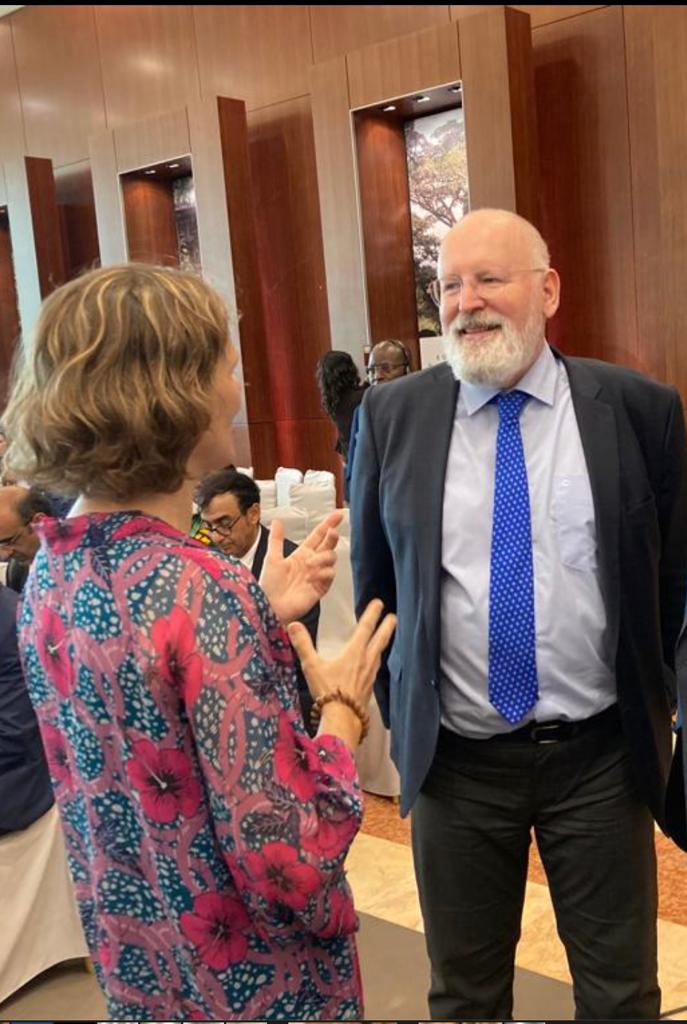

09.03.2023
On March 1st and 2nd the One Forest Summit took place in Libreville. ATIBT was present to support its members committed to sustainable forest management. What did we learn from the summit? What decisions were made, and are they convincing?

On March 1, ATIBT hosted a roundtable discussion on sustainable forest management in relation to markets. This discussion addressed the domestic timber market in Central African countries, an increasingly important topic in the forest economy.
The conclusions of this roundtable are that the forestry and timber sector committed to sustainably managed production needs markets, all markets that fully understand the approach taken by governments and forestry companies throughout the sub-region to implement responsible and certified forest management. Domestic markets are also essential to ensure the future of the sustainable sector, but this will not be easy. We need a fiscal approach that can facilitate access to sustainable wood by consumers in our countries. A concrete example is the reduction of VAT on wood for the domestic market, based on the example of a basic material such as cement.
Furthermore, innovative solutions in terms of taxation, sponsorship, but also in terms of carbon and biodiversity finance, will have to be implemented, because the wood markets, with their difficulties and uncertainties, will not be enough to support the sustainably managed wood sector alone.
ATIBT also attended a workshop on a crucial topic to reduce unfair competition from illegal timber on the markets and to fight against forest degradation, namely traceability. Rosalie Matondo, Minister of Forest Economy of the Republic of Congo, concluded the discussions by insisting on the need for mutual trust between producing and importing countries, in light of the new European regulation on imported deforestation: "The first word that is important is trust, trust between producing countries and the countries that buy our products from our countries. (...) What I retain from this beautiful panel, (...) is this desire that European markets open up to African products, and so we will make this journey together so that transparency is in place and our international operation moves forward."
Replay of the workshop on traceability, the key to sustainability
In parallel, discussions on innovative finance were held, opening with the presentation of the Global Environment Facility (GEF) report entitled "Opportunities and Challenges for Biodiversity-Positive Carbon Credits and Nature Certificates" (full report in English and summary in French). This report presents a status report, diagnosis and recommendations for unlocking new financial resources for the conservation, sustainable use and restoration of biodiversity in a socially inclusive manner, focusing on two emerging instruments: biodiversity impact carbon credits and nature certificates. It was prepared by a high-level working group after COP27.
The commitment of the private sector to play a role in the netzero was welcomed, as companies increasingly understand their dependence on nature. Regulations and changing accounting standards are also pushing them in this direction.
All the replays can be found here
During this 2 days, we highlighted the development of the forest economy, the need for affordable prices for the domestic market, and the need for better infrastructure to reduce logistics costs.
 Jacqueline Lardit van de Pol in discussion with Frans Timmermans, Vice-President of the European Commission, on the need to improve infrastructure
Jacqueline Lardit van de Pol in discussion with Frans Timmermans, Vice-President of the European Commission, on the need to improve infrastructure
At the end of the One Forest Summit, an agreement was signed between forest countries and the international community: the Libreville Plan. This agreement is based on five pillars:
It is regrettable that this action plan does not mention any concrete ways of paying for the "services provided to the rest of the world by forest countries". Alain Karsenty comments this issue in an article in Le Monde. "The rhetoric of "payment for services provided by nature" is totally inappropriate because it takes away from the essential question of the means by which we can advance the fight against deforestation: What policies should be implemented to bring about a profound change in agricultural practices, to clarify land rights, to allow populations access to alternative energies to charcoal, to accelerate the demographic transition in Africa through the economic and social autonomy of young women, to develop the territories, to progress towards the rule of law... And this rhetoric also hides the changes that need to be made in industrialized countries in terms of consumption patterns (meat, agrofuels, etc.) to reduce the demand for products that contribute to the loss of biodiversity. ) to reduce the demand for products that contribute to deforestation. The two logics are very different: in one, rents are paid. In the other, we encourage changes or the preservation of virtuous practices.”
Another outcome of the One Forest Summit: a budget of 100 million euros (50 million from France, 20 million from the Walton Foundation, and 30 million from Conservation International) has been allocated for a "Positive Conservation Partnerships" (PCP) initiative. This initiative, focused on the protection of carbon stocks and biodiversity in forest countries, aims to set up short-term contracts for volunteer countries that will be able to present returns as early as the COP28 in Dubai at the end of 2023. Again, no concrete proposal. Biodiversity certificate mechanisms have been mentioned, and this is an issue that ATIBT is closely following (see our article on this subject). Several biodiversity certification methodology projects are under development and more or less advanced; the OBC, the Organization for Biodiversity Certificates that we joined at the end of 2022, is working on the development of a methodology that should make biodiversity certificates operational by 2025.
What we must remember from this summit is :